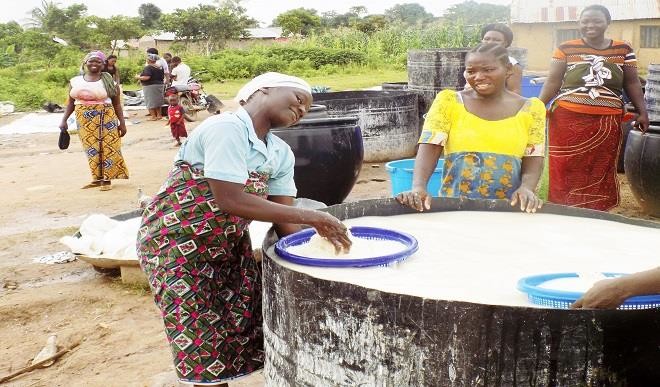Encounter with ‘cassava women’ of Gosa
Their hands are half-hidden by the whitish liquid, their eyes focused inside the wide drums. While their mates are in school seated in a math class or doing something equally remarkable, these teenage girls in a village called Gosa in the Federal Capital Territory (FCT), work cassava from early hours of the morning. In a […]


Their hands are half-hidden by the whitish liquid, their eyes focused inside the wide drums. While their mates are in school seated in a math class or doing something equally remarkable, these teenage girls in a village called Gosa in the Federal Capital Territory (FCT), work cassava from early hours of the morning. In a swampy environment, the girls and some women put their backs to work. Large tanks, with their tops sawed off, hold soaked cassava that promises to turn to ‘akpu,’ a staple popular with some ethnic groups, after they are done working it.
A motorcycle stops where the women work. A young lady bargains for a hefty bag of cassava flour. Soon, deal settled, she is driven away by the rider, bag in-between them.
Fortyish Mrs. Janet Ar is a dealer. She started the business 12 years ago when she bought cassava in a wheel barrow for N1, 00 and N1, 500 from farmers in Niger State. That’s the way she started – small. But now cassava is expensive. But she has equally grown as a businesswoman. She used to buy stuff worth N15, 000 now N50, 000 in pick-ups.
Since Mrs. Ar is the dealer, she finds women willing to work to handle the processing of the cassava to ‘akpu,’ and sometime flour. So, the girls and the women peel, wash, soak, and process to ‘akpu’ and sometime flour. Often, they also make garri by the side.
Ready, these stuffs are transported to nearby to Gosa market, which holds once a week. A small sack of ‘akpu’ is sold for N1, 500. “But it used to be N300, N500 and N700,” Ar, who is married with four children says. “If I buy three pick-ups a week, I make roughly N150, 000 as profit.” With this achievement, she is a very happy and grateful trader.
But not all the women smile as much as the dealer does. Ayenaje Joseph has been working cassava at that same spot for five years. Her responsibility is to peel and soak the tubers. After she like several of her colleagues are done, they get paid. “Preparing the cassava is hard work that gives back pain. We peel, soak in a tank and let it ferment for three days, after which we wash it and it becomes raw akpu,” she explains.
“It’s like pap that settles after being put in water. After we wash it we give it time to settle, then we pour away the water and put the substance in a sack. Then it is ready for sale. In a week I make at least N2000 from peeling and another N2000 for washing,” Ayenaje adds.
Ladi Suleiman also washes peeled cassava, although she has been doing so for only two years, and goes home with N500 daily. Before she found this line of work she was a firewood seller, and because it was strenuous, she sought an alternative.
Rahab Daniel too has some history in the cassava business. It’s been six years since she stopped selling soft drinks and sachet water at Gosa market for her present occupation.
There’s one thing these women at Gosa have in common. They work joyfully. Mostly Gbagyi and unschooled, they decided to find work that will provide for their families.
